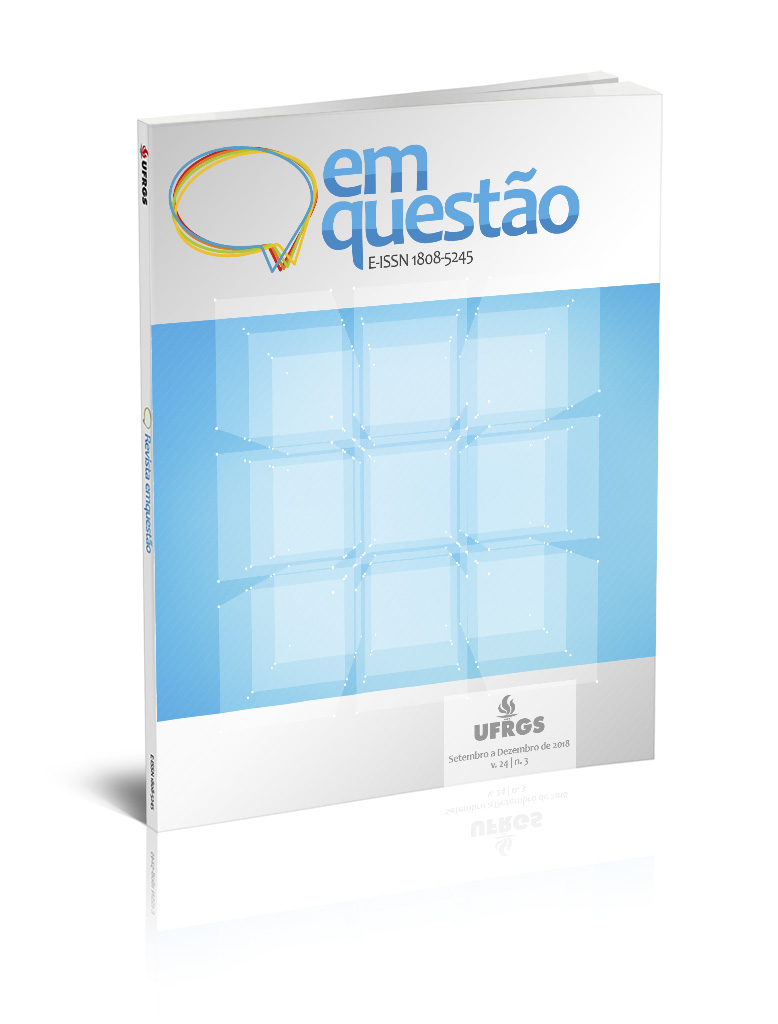Parabolicamará: redundancy and innovation in Tropicália's television information
DOI:
https://doi.org/10.19132/1808-5245243.316-333Keywords:
Tropicalia. Information theory. Political economy. Media capital. TV.Abstract
It aims to discuss the tension between redundancy and innovation in the television information of the tropicalist musical movement. Epistemologically, it adopts an interdisciplinary perspective between Information Science and Social Communication, exploring two theoretical approaches shared by both, in different degrees: the Theory of Information and the Political Economy of Information, Communication and Culture. Methodologicly, it establishes a dialogue between the Theory of Information, in its appropriation by Augusto de Campos, in the article Informação e redundância na música popular, and the Political Economy of Information, Communication and Culture, mainly through its development in Marco Schneider’s Dialética do gosto. In this sense, it situates the debate around the aesthetic-informational component of Tropicália, in the context of the Brazilian cultural industry, of the late 1960s. And it discusses the way in which it participates in the conformation of tropicalist mediated information. The main problem is related to the possibility of the character of vanguard or innovation of the musical movement in the stages of the programs of the TV audience at the time. The main question is how the cultural industry, despite its dominant tendency to redundancy, enabled a wide circulation of innovative information in Brazilian popular music during the analyzed period. Without ignoring the relative autonomy and the agency of tropicalist artists, the main hypothesis of this paper is that its innovative nature would have been favored by the liberal and competitive stage of the media capital of the time, more opened to innovation than the subsequent phases, monopolistic and fictitious.Downloads
References
VELOSO, Caetano. Conversa com Caetano Veloso [entrevista]. Entrevistador: Augusto de Campos. In: CAMPOS, Augusto de. Balanço da bossa e outras bossas. 4. ed. São Paulo: Perspectiva, 1986.
CAMPOS, Augusto de. Balanço da bossa e outras bossas. 4. ed. São Paulo: Perspectiva, 1986. Publicado originalmente em 1968.
CAMPOS, Haroldo. Uma poética da radicalidade. In: ANDRADE, Oswald. Obras completas. Rio de Janeiro: Civilização Brasileira, 1971. V. 7, Poesias reunidas.
CAMARÁ. In: DICIONÁRIO Brasileiro de Capoeira. [S.l.]: Capoeira do Brasil, 2001.
CAMARÁ. In: DICIONÁRIO da Capoeira. Trindade: Associação Desportiva Arte Cultura Capoeira, c2011.
FAVARETTO, Celso. Tropicália: alegoria, alegria. 3. ed. São Paulo: Ateliê Editorial, 2000.
HALL, Stuart. Codificação/decodificação. In: SOVIK, Liv (Org.). Da diáspora: identidades e mediações culturais. Belo Horizonte: UFMG, 2003.
MARX, Karl. O capital: livro 4, teorias da mais-valia: história crítica do pensamento econômico. Rio de Janeiro: Civilização Brasileira, 1980.
MATTELART, Armand. Estudiar comportamentos, consumos, hábitos y prácticas culturales. In: ALBORNOZ, L. (Org.). Poder, médios, cultura: una mirada crítica desde la economia política de la comunicación. Buenos Aires: Paidós, 2011.
MATTELART, Armand; MATTELART, Michele. História das teorias da comunicação. São Paulo: Loyola, 2008.
MORAES, Dênis de. A comunicação sob domínio dos impérios multimídias. In: DOWBOR, Ladislau et al. Desafios da comunicação. Petrópolis: Vozes, 2000. p. 13-14.
PAIXÃO, Cláudia Regina. Televisão e música popular na década de 60: as vozes conflitantes de José Ramos Tinhorão e Augusto de Campos. 2013. Dissertação (Mestrado em Comunicação) - Faculdade de Arquitetura, Artes e Comunicação, Universidade Estadual Paulista, Bauru. 2013.
PIGNATARI, Décio. Informação. linguagem. comunicação. Cotia: Ateliê Editorial, 2008.
SCHNEIDER, Marco. A dialética do gosto: informação, música e política. Rio de Janeiro: Circuito, 2015.
WOLF, Mauro. Teorias da comunicação. Lisboa: Presença, 1995.
Downloads
Published
How to Cite
Issue
Section
License
Copyright (c) 2018 Em Questão

This work is licensed under a Creative Commons Attribution 4.0 International License.
Authors who publish with this journal agree to the following terms:
Authors will keep their copyright and grant the journal with the right of first publication, the work licensed under License Creative Commons Attribution (CC BY 4.0), which allows for the sharing of work and the recognition of authorship.
Authors can take on additional contracts separately for non-exclusive distribution of the version of the work published in this journal, such as publishing in an institutional repository, acknowledging its initial publication in this journal.
The articles are open access and free. In accordance with the license, you must give appropriate credit, provide a link to the license, and indicate if changes were made. You may not apply legal terms or technological measures that legally restrict others from doing anything the license permits.













